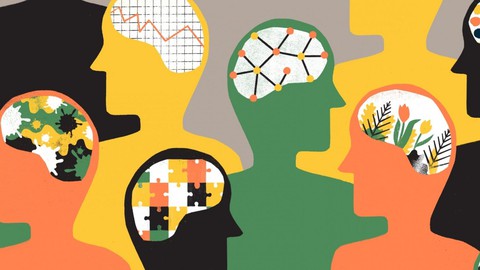Affective Resilience via sustaining +ve emotions

What you’ll learn
-
To accept inner positive influences in life
-
Personal development of students through positive psychology
-
Get tools to fight pessimism and improve vision towards life
-
Activate your confidence and self esteem via personality traits
-
Interpersonal Aspects of Happiness and well being
Requirements
-
No requirements
Description
The course aims to provide students with an introduction to the core ideas of inculcating happiness and well-being to manage stress, anxiety and depression. Further acquainting them with the significance of positive thinking, courage and determination, meaning of life, gratitude and compassion in life.
The structure of the course is as follows:
· How Thoughts and Ideas are executed in Humans?
· Cognitive and emotional processes in positive psychology.
· Role of Brain Chemicals in our Cognitive Thinking Process.
· How Negative Thoughts form a loop/ recursive pattern?
· Ways to break the repetitive thoughts loop/ overcome our biases.
· Un-tapping the potential of positive Thinking.
· FEAR- Face Everything and Rise (You vs You)
· Personal and Interpersonal construal of happiness/ Personality Traits.
· Misconception about Happiness.
· Unveiling the role of persistence and determination.
· Interpersonal aspects of positive psychology includes themes on positive relations, forgiveness, transforming conflicts and positive communication.
· Role of resilience, post-traumatic growth, meaning of life and gratitude.
· Achievements and accomplishments: self-concordance and goal-setting, grit, self-regulation.
· Putting Strategies into practice.
This course has the power enough to transform the course of your life. It will be a journey from misery to your well being. Researchers continue to explore the effects of positive thinking and optimism on health. Health benefits that positive thinking may provide include:
- Increased life span
- Lower rates of depression
- Lower levels of distress
- Better psychological and physical well-being
- Better cardiovascular health and reduced risk of death from cardiovascular disease
- Better coping skills during hardships and times of stress
You can learn to turn negative thinking into positive thinking. The process is simple, but it does take time and practice — you’re creating a new habit, after all. Here are some ways to think and behave in a more positive and optimistic way:
- Identify areas to change. If you want to become more optimistic and engage in more positive thinking, first identify areas of your life that you usually think negatively about, whether it’s work, your daily commute or a relationship. You can start small by focusing on one area to approach in a more positive way.
- Check yourself. Periodically during the day, stop and evaluate what you’re thinking. If you find that your thoughts are mainly negative, try to find a way to put a positive spin on them.
- Be open to humor. Give yourself permission to smile or laugh, especially during difficult times. Seek humor in everyday happenings. When you can laugh at life, you feel less stressed.
- Follow a healthy lifestyle. Aim to exercise for about 30 minutes on most days of the week. You can also break it up into 10-minute chunks of time during the day. Exercise can positively affect mood and reduce stress. Follow a healthy diet to fuel your mind and body. And learn techniques to manage stress.
- Surround yourself with positive people. Make sure those in your life are positive, supportive people you can depend on to give helpful advice and feedback. Negative people may increase your stress level and make you doubt your ability to manage stress in healthy ways.
- Practice positive self-talk. Start by following one simple rule: Don’t say anything to yourself that you wouldn’t say to anyone else. Be gentle and encouraging with yourself. If a negative thought enters your mind, evaluate it rationally and respond with affirmations of what is good about you. Think about things you’re thankful for in your life.
Who this course is for:
- For Everyone seeking inner peace and real happiness through positive thinking






